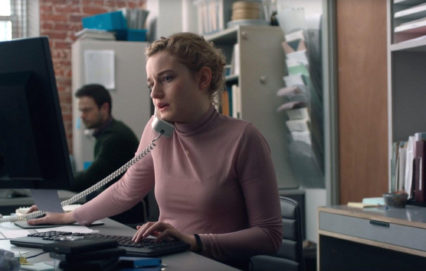Rosie Couch explores Kitty Green’s new film The Assistant, a thoughtful take on sexual harassment in the workplace for the #MeToo era.

Kitty Green’s new release The Assistant (2020) depicts a day in the life of Jane (Julia Garner) – the assistant to a powerful, unnamed executive at a large entertainment company. The opening sequence depicts Jane arriving at work while the skies are still dark, ascending the floors of the building via a lift, clutching an armful of files. She performs a series of mundane tasks: printing and arranging documents, or refilling minifridges with bottled water. Entering her unnamed boss’s office to place some papers on his desk, she notices a single earring on the floor. She picks it up and places it safely in her desk drawer. Next, still working on the careful organisation of her boss’s office, Jane dons a pair of rubber gloves and begins to clean a stain on the sofa.
The origins of said stain are not highlighted but, with the aforementioned earring in mind, it is easy to jump to sordid conclusions. Jane, however, is a matter of fact about the task at hand. For Jane, we assume, such tasks are an everyday occurrence. She could be emptying a bin, or switching on a photocopier; her expression does not falter. She walks around the expanse of the office, switching on the lights one strip at a time, thus foreshadowing the way in which her cinematic narrative illuminates women’s experiences within hostile work environments. Given how frustratingly long such settings, such structures, have served to oppress, it is appropriate that space should fill with a drab fluoresce, a dull buzz.
The Assistant has been described as the first ‘real’ #MeToo film. This judgment prompts the question: What separates ‘real’ #MeToo cinema from existing work about the dynamics of sexual harassment within the workplace? Recent work such as Bombshell (2019) and Promising Young Woman (previously due to be released in April 2020), also examine said dynamics and the power imbalances that allow them to operate. Like Bombshell, which was based on women’s experience of sexual harassment while working for Fox News, the setting of The Assistant is loosely based on Miramax – the American entertainment company founded by the Weinstein brothers.
So, what makes The Assistant strikingly different? Representations of #MeToo in the media, of the trials and allegations, hone in on the details of assaults, the personal lives of victims, sensationalising at every turn. Underneath said accounts, so much of the #MeToo movement is about what is seen and spoken, ignored and buried. It is the depiction of small yet significant moments that makes The Assistant particularly distinctive. It is a film about silence, chosen or slyly enforced. It highlights the odd encounters, the gendered slights, that bolster structural inequalities within workplace environments.
On watching, The Assistant’s biggest strength lies in its representation of the insidious microaggressions that make such spaces particularly hostile for women. There is the colleague who mansplains how she might conclude an email; the coat or baby shoved thoughtlessly into her arms; the mug left by the sink as she washes up; the colleagues who do not step aside as she attempts to leave a room, forcing her to squeeze between their bodies. But Jane does not have to worry about sexual harassment in the workplace, she is told, because she is not her boss’s type. Covering up his mishaps, silently bearing the drudgery of it, Jane is not quite inside of her boss’s office, but she’s not completely outside of it, either. Towards the end of the film, a significantly younger woman named Sienna (Kristine Frøseth) arrives at the office, stating that she is a new assistant, before being ferried to a nearby hotel. As a result, Jane begins to question her own position. If Sienna is a new assistant, what is Jane doing for the company? What is Jane’s role in her boss’s obvious misconduct if she does not report his behaviour?
Any woman who has worked in a supportive or entry-level role will likely be transported back to moments from their own past when watching this film. The Assistant is an uncomfortable, and, actually, rather an anticlimactic watch. The refusal to conform to the narrative conventions of Hollywood cinema, given the critical stance that the film is taking against the intricacies of the industry itself, is highly appropriate. If The Assistant was a film with a classic beginning, middle, and end, the latter third of the film would show Jane reporting the executive and having her concerns taken seriously. Her boss would be held accountable for his actions and, as an audience, we would be relieved that justice had somehow been served. Instead, when Jane approaches another senior man within the company named Wilcock (Matthew Macfadyen) and tells him of her suspicions, they are stealthily manipulated and silenced. Is Jane sure? Why is she really saying these things about her boss? Is she jealous of Sienna? Because that’s how it will look. How much trouble does Jane really want to make for herself?
The film closes with a shot of Jane leaving work, and walking down a dark street. Will she return? As long as they have her silence, she has her job – working for a boss who remains unnamed, unseen throughout. The Assistant does not have a neat ending. And this, perhaps, is how it might secure its position as a ‘real’, or highly realistic, #MeToo film. There is no straightforward way of tying the threads of the many narratives which serve to silence, subjugate, and subordinate women. Inside and outside of the office, there is work to be done yet.
The Assistant by Kitty Green is available to stream on various platforms. For more information click here.
Rosie Couch is a regular contributor to Wales Arts Review.



 Enjoyed this article? Support our writers directly by buying them a coffee and clicking this link.
Enjoyed this article? Support our writers directly by buying them a coffee and clicking this link.








